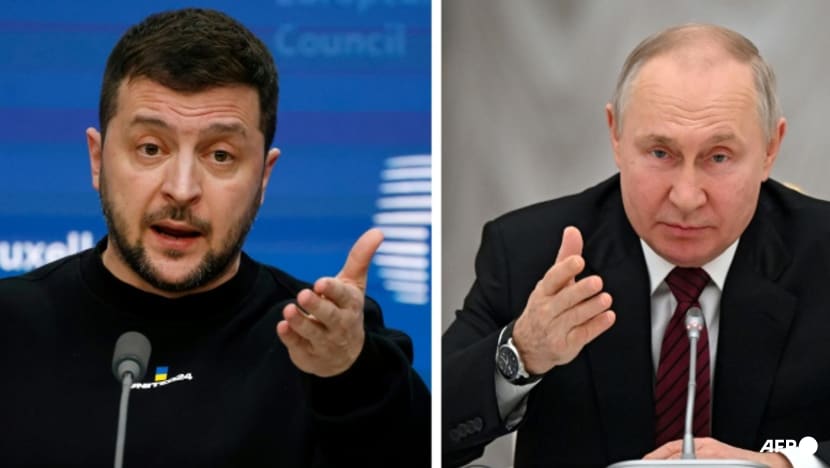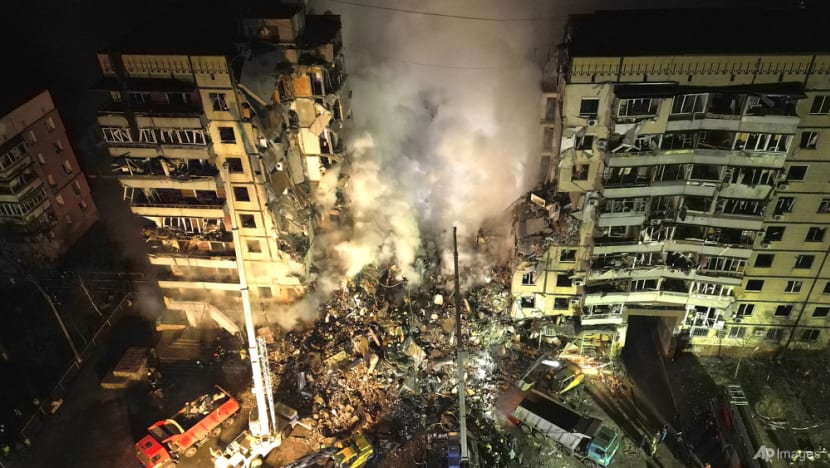Commentary: Calls for peace in Ukraine one year after Russia’s invasion are unrealistic
For any hope of a lasting peace, Russia must prove itself willing and capable of accepting justice and honouring its agreements. The track record under Russian President Vladimir Putin here does not bode well, says this academic.

Ukrainian President Volodymyr Zelenskyy and Russian counterpart Vladimir Putin. (Photo: AFP/Ludovic Marin, Grigory Sysoyev)
LONDON, Canada: As we reach the one-year anniversary of Russia’s full-scale invasion of Ukraine, politicians continue to call for peace.
Elizabeth May, Canada’s Green Party leader, is among the most recent to make such a call in Canada. Former British Labour Leader Jeremy Corbyn has been among the most consistent.
Even Pink Floyd frontman Roger Waters appealed for peace at the United Nations Security Council on Feb 8, at the behest of the Russian Federation, downplaying Russian aggression.
These calls for peace neglect to consider the challenges that stand in the way of peace.
WHY HAS PEACE NOT HAPPENED YET?
Peace has been elusive since Feb 24, 2022. Early in the escalation, leading into the spring of 2022, frequent news reports suggested peace could be on the horizon before negotiations collapsed.
Russia’s refusal to honour agreements for humanitarian zones contributed to the collapse of the talks.
As the war has continued, Ukraine and the world have become aware of the scale of atrocities Russia has perpetrated, including the mass graves in Bucha, Izyum and Mariupol; the discovery of torture chambers in Kherson; and the forced removal of children from Ukraine into Russia.
Russian officials have confirmed the latter practice, despite it being in contravention of the UN’s Genocide Convention. Russia also continues to attack civilian infrastructure, terrorising Ukrainian civilians.

These realities underscore the key problem with a ceasefire. Any territory still occupied by Russia condemns Ukrainians living in this territory.
For any hope of a lasting negotiated settlement, Russia must prove itself willing and capable of accepting justice for its actions and honouring its agreements. The Russian track record under President Vladimir Putin here does not bode well.
RUSSIA WON’T BACK DOWN; UKRAINE CAN’T
This issue is connected to a second, more serious obstacle: Russia maintains its extreme aims.
Russia has consistently noted it will only accept a negotiated settlement that acknowledges Russian control of the territories of Zaporizhzhia, Kherson, Donetsk and Luhansk that it claims to have annexed, even after Ukraine took back control in some regions.
Russia has not wavered from this position.
Ukraine has maintained its own aims - to liberate territory, including Crimea, from Russian occupation. Ukrainian President Volodymyr Zelenskyy recently offered a 10-point plan for peace, which includes demands for Russian troops to leave Ukraine and for war crimes tribunals. Russia rejected Zelenskyy’s plan.
A ceasefire, or lasting peace, is incredibly difficult without one side moving from its position.
Currently, the military reality on the ground, despite Russia’s initial aims being thwarted and Ukrainian successes in defending its territory, does not seem to be leading Russia to reconsider its efforts. Neither has the situation warranted a need for Ukraine to do the same.
Some Westerners have started to suggest liberating Crimea may be one aim Ukraine may need to reconsider.
Russia, in the meantime, is gearing up for a renewed offensive, taking advantage of the troops called up in its “partial mobilisation” in the autumn of 2022. Ukrainians are training on and deploying new equipment provided by the West. The critical period in the war could come in the next few months.
But war is hard to predict. Many figures, including American intelligence officials, wrongly believed Ukraine was likely to collapse in February 2022.
THE ELUSIVE "LASTING PEACE"
Well-meaning calls for peace are understandable and laudable, especially with concerns over nuclear escalation, the high loss of life in Ukraine and a “forever war” taking place.
But attaining peace is complicated; wishful thinking won’t make it happen. Even in major wars, like World War I where a stalemate defined operations for years, peace was difficult to attain because of the aims of the belligerents.
Some groups have tied their calls for peace or a ceasefire with demands to end shipments of munitions and weaponry to Ukraine.
Others believe Ukraine cannot win. Some claim Ukraine should give up territory or negotiate to maintain its existence.
These responses are short-sighted. Effectively, they encourage Russia’s aggression while removing the support Ukraine has used to defend its territory to great effect so far. They also ensure no justice for Ukrainians over Russian atrocities.
Others have called for a return to pre-Feb 24, 2022 borders. These calls fail to recognise that world no longer exists.
Putin - and those who followed his lead - gambled for more territory, hoping the West would not react. Russia wanted to claw more territory from Ukraine; it wasn’t satisfied with the previous status quo. It’s clearly not reconsidered this stance.
These realities underpin why many experts, including myself, stress the need for Russia’s defeat in Ukraine in the absence of other reliable options. The best path to a lasting peace in the region is for Ukraine to liberate its territory and for Russia to accept it cannot act aggressively.
WHAT’S AT STAKE?
A forced ceasefire or peace today, without reflecting on what it would mean for Ukrainians under Russian occupation and without recognising that Ukraine has a right to defend itself, means accepting a situation that will bring little resolution and prolong tensions.
To appreciate these obstacles, to highlight the unlikelihood of peace in this moment, or to support Ukraine is not to give into warmongering.
Rather, such a viewpoint recognises the realities of this conflict, one that Russia escalated into a war of aggression with imperialistic aims. Ukraine is defending its territory and its people.
A time will come when Russia or Ukraine may need to recognise the military realities on the ground and tough decisions will need to be made in negotiations. That moment has not yet come.
Ukrainians hope for peace; for them, it will only come when Russia leaves Ukrainian territory.
However, calls for peace that suggest Ukraine should give up its territory simply to end the war will condemn Ukrainians in occupied territories to what will likely be unspeakable horrors, and will provide a precarious foundation for lasting peace.
Oleksa Drachewych is an assistant professor in history, Western University. This commentary first appeared on The Conversation.
















